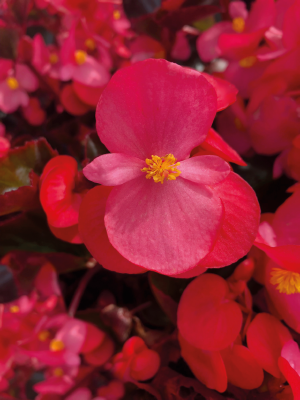
BIG® Deep Rose Bronze Leaf
Item no.: BB0108PThe First Interspecific Begonia on the Market
- Vigorous, well-branched and uniform plants for landscape use as well as containers
- Extraordinary flower power with a BIG® flower size
- Flowering two weeks earlier than competing varieties
- Outstanding performer in all climates and soils
- Rain and heat tolerant
Technical Guide: Click here
All information in our technical guide is based on our own trials and would therefore be as guideline only. Detailed cultivation aspects vary depending on climate, location, time of year and environmental conditions. Benary expressly disclaims any responsibility for the content of such data/information and makes no representation or warranty for the cultivation of any products listed. It is recommended that growers conduct a trial of products under their own conditions.
- Crop Time
- Spring: 14 - 18 weeks
- Height ∅
- 28 ″ / 70 cm
- Width ∅
- 23 ″ / 58 cm
- Exposure
- Sun - Partial shade
- Seed Form
- Pelleted Seed
- Best Uses
- Bedding, Landscape, Pot Plant
Culture guide
Usage
Packs, Pots, Hanging Baskets, Mixed Containers and Landscape
Sow time
From mid of December onwards
Sowing method
1-2 pellets per plug
Germination
Begonias require light to germinate, do not cover seed or pellets. Germination occurs in 5-10 days at 73-80 °F (23-26 °C), with a relative humidity of 95 % or higher. For pelleted seed, slightly higher temperatures and 100 % relative humidity aid in uniformity of germination. Germination media with a pH of 5.5-6.5 is optimum. Uniformly moist and well-drained soils are important.
Growing on
6-7 weeks after sowing transplant 1 plug into 12-13 cm pot (12 cm: 35-40 pots/m², 13 cm: 30-35 pots/m2). The plugs should have 2-3 sets of true leaves. High light conditions promote better branching and earlier flowering.
Media
Sowing media: pH 5.5-5.8; EC 0.5-0.75
No covering required.
Growing on: pH 5.5-5.8; EC 1.2-1.5Alternate between moisture levels wet and medium. Let plants dry back to at least a moist before re saturating to a wet. Extremely dry plants will have a grayish cast to the leaves. Avoid watering plants under high temperature and light when the leaf temperature is excessive.
Temperature
Plug culture: 22-24 °C days 1-11. For irrigation use warm water (above 18 °C) only.
Growing on: 20-21 °C nights, 18-19 °C days for the first 14 days or until the roots reach the bottom of the container. Thereafter temperatures may be lowered to 16-18 °C day and night. An ADT (average daily temperature) of 19 °C will give the fastest finished crop. Once well established in the final container, approximately two to three weeks after transplanting from a 288 plug the temperature can be lowered further to 13-15 °C. This will keep the plants toned and prevents too large of leaves.
Fertilization
Moderate fertilization levels are required. Fertilize at 150 ppm nitrogen weekly, watching excessive salt built-ups.
Tip
BIG® Begonias are the BEST! I give BIG®s to friends and family who love them because they perform in heat, cold, dry, wet and just keep flowering! And since the blossoms are edible I love to add them to drinks, salads & dips.
Stage I Starts with the radicle breaking through the testa. The roots are touching the medium. Ends with fully developed cotyledons.
Stage II Starts from fully developed cotyledons. Ends with the fully developed true leaf or true leaf pair.
Stage III Starts from the fully developed true leaf or true leaf pair and ends with 80% of the young plants being marketable.
Stage IV All young plants are ready for sale and in the process of being hardened off. This stage lasts about 7 days.
The cultural recommendations are based on results from trials conducted under Central European conditions. Different conditions in other parts of the world may lead to deviations in results achieved.










